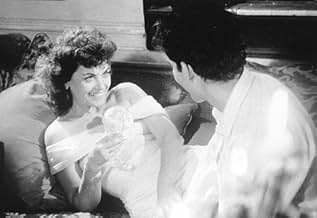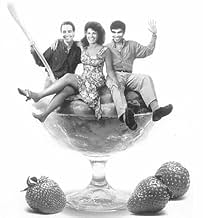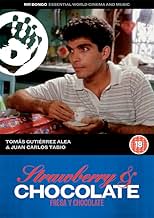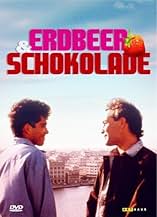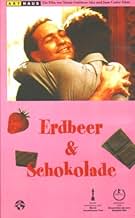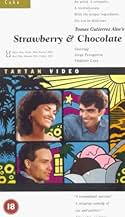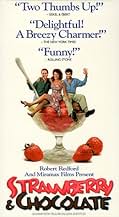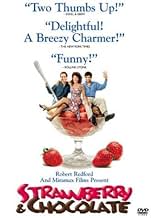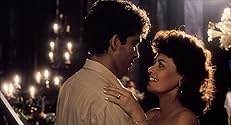VALUTAZIONE IMDb
7,4/10
6191
LA TUA VALUTAZIONE
Aggiungi una trama nella tua linguaStory of two men who are opposites: one gay, the other straight; one a fierce communist, the other a fierce individualist; one suspicious, the other accepting; and how they come to love each... Leggi tuttoStory of two men who are opposites: one gay, the other straight; one a fierce communist, the other a fierce individualist; one suspicious, the other accepting; and how they come to love each other.Story of two men who are opposites: one gay, the other straight; one a fierce communist, the other a fierce individualist; one suspicious, the other accepting; and how they come to love each other.
- Regia
- Sceneggiatura
- Star
- Candidato a 1 Oscar
- 25 vittorie e 2 candidature totali
Recensioni in evidenza
STRAWBERRY AND CHOCOLATE (Fresa y Chocolate)
Aspect ratio: 1.85:1
Sound format: Ultra-Stereo
Used as an unwitting pawn by his pro-revolutionary colleagues, a naive student (Vladmir Cruz) is encouraged to develop a platonic relationship with a flamboyant gay artist (Jorge Perugorria), whose political allegiances have fallen under suspicion. But as their friendship deepens, Cruz is transformed by Perugorria's resistance to the Cuban regime, even as the forces of oppression begin to close around them.
Based on a short story ('El Lobo, el Bosque y el Hombre Nuevo') by screenwriter Senel Paz, STRAWBERRY AND CHOCOLATE is a joyous celebration of life and non-conformity, distinguished by Perugorria's vivid performance as a self-proclaimed 'outsider' who rejects his friend's unquestioning loyalty to the Cuban political system that is stifling their beloved homeland. Their budding relationship is complicated by Perugorria's unrequited love for Cruz, depicted here with dignity and compassion, though it's their political differences which ultimately unite the two characters, even as Perugorria is forced to reap the whirlwind of his public defiance. Also starring Mirta Ibarra as Perugorria's flaky neighbor, who introduces virginal Cruz to the joys of sexual liberation! It isn't a terribly cinematic film, but production values are solid, and the characters are played with such integrity, it hardly matters; this is a movie in which ideas take precedence over action, and the emotional payoff is quite powerful indeed. Beautiful music score by Jose Maria Vitier, too. Directed by Tomás Gutiérrez Alea and Juan Carlos Tabío.
NB. The original US version (released by Miramax) is missing approximately six minutes of footage. Absent material includes a brief conversation about racism during Cruz's first visit to Perugorria's apartment, and a sad little sequence in which the two characters pretend not to notice each other after meeting by accident in a bookstore.
(Spanish dialogue)
Aspect ratio: 1.85:1
Sound format: Ultra-Stereo
Used as an unwitting pawn by his pro-revolutionary colleagues, a naive student (Vladmir Cruz) is encouraged to develop a platonic relationship with a flamboyant gay artist (Jorge Perugorria), whose political allegiances have fallen under suspicion. But as their friendship deepens, Cruz is transformed by Perugorria's resistance to the Cuban regime, even as the forces of oppression begin to close around them.
Based on a short story ('El Lobo, el Bosque y el Hombre Nuevo') by screenwriter Senel Paz, STRAWBERRY AND CHOCOLATE is a joyous celebration of life and non-conformity, distinguished by Perugorria's vivid performance as a self-proclaimed 'outsider' who rejects his friend's unquestioning loyalty to the Cuban political system that is stifling their beloved homeland. Their budding relationship is complicated by Perugorria's unrequited love for Cruz, depicted here with dignity and compassion, though it's their political differences which ultimately unite the two characters, even as Perugorria is forced to reap the whirlwind of his public defiance. Also starring Mirta Ibarra as Perugorria's flaky neighbor, who introduces virginal Cruz to the joys of sexual liberation! It isn't a terribly cinematic film, but production values are solid, and the characters are played with such integrity, it hardly matters; this is a movie in which ideas take precedence over action, and the emotional payoff is quite powerful indeed. Beautiful music score by Jose Maria Vitier, too. Directed by Tomás Gutiérrez Alea and Juan Carlos Tabío.
NB. The original US version (released by Miramax) is missing approximately six minutes of footage. Absent material includes a brief conversation about racism during Cruz's first visit to Perugorria's apartment, and a sad little sequence in which the two characters pretend not to notice each other after meeting by accident in a bookstore.
(Spanish dialogue)
`Strawberry and Chocolate' (1993)is set in contemporary Havana. The luster of that city has dimmed after nearly four decades of Castro's rule. David (Vladimir Cruz), a student and avid Castro supporter, is on the rebound after losing his girlfriend. He had taken her to a cheap hotel to make love, but the place is so shabby it puts her off. Instead, he promises never to touch her until they marry. In the next scene, she marries someone else while David stands sullenly among the well wishers at the registry office. Then he meets Diego (Jorge Perugorría).
Diego, who is flamboyantly gay, parks himself at David's table in an outdoor café to eat a dish of strawberry ice cream. For David, this is suspicious because chocolate is also available. Diego says some people like chocolate, some like strawberry, an innocuous line that gives the movie its title and also hints at the odd couple relationship to follow.
Diego does not disguise his sexual interest in David, but is also interested in giving David an education the regime denies him. The older man is far more cultured than his new friend. Offers of books banned in Castro's Cuba, such as a novel by Mario Vargas Llosa or the poems of John Donne, lure David to his apartment for tea and talk. When David reports that Diego is involved with a forbidden art exhibit, he is directed to befriend Diego to find out more information. `Strawberry and Chocolate' thus sets their emerging friendship against the backdrop of two bleak themes: anti-gay prejudice in the Castro regime, and the betray-thy-neighbor expectation of a police state.
But almost nobody conforms to type. A woman in Diego's building who is part of the neighborhood Vigilance Committee, on the watch for counter-revolutionary activities, turns out to be a good friend to Diego and then to David. Everyone plays one game with the government, but a different one in their private lives. This is a lesson David has to learn. Encounters with women along the way provide a few subplots, but the heart of the story lies in the hearts of the two men.
`Strawberry and Chocolate' is credited to directors Tomás Gutiérrez Alea and Juan Carlos Tabío. The former was, until his death shortly after completing this film, the best known filmmaker in Cuba, winning an international reputation in the 1960's for titles such as `Memoirs of Underdevelopment,' a look at life in Cuba in the early Castro years that tempers criticism with prudence. `Strawberry' is smaller in scale and less overtly political.
The film was nominated for an Oscar in 1995 and won awards at film festivals around the world (including the Sundance Festival). American viewers may instantly slot it with Hollywood features that show how straight characters learn life lessons from a wiser gay companion (`Boys on the Side,' `As Good As It Gets'). And at times Diego's excesses recall the worst performances of Harvey Fierstein. Yet superb performances by the two male leads eventually move beyond stereotypes they and the audience initially share about each other, transforming their unexpected friendship into a statement that puts the lie to official groupthink in a repressive regime.
Diego, who is flamboyantly gay, parks himself at David's table in an outdoor café to eat a dish of strawberry ice cream. For David, this is suspicious because chocolate is also available. Diego says some people like chocolate, some like strawberry, an innocuous line that gives the movie its title and also hints at the odd couple relationship to follow.
Diego does not disguise his sexual interest in David, but is also interested in giving David an education the regime denies him. The older man is far more cultured than his new friend. Offers of books banned in Castro's Cuba, such as a novel by Mario Vargas Llosa or the poems of John Donne, lure David to his apartment for tea and talk. When David reports that Diego is involved with a forbidden art exhibit, he is directed to befriend Diego to find out more information. `Strawberry and Chocolate' thus sets their emerging friendship against the backdrop of two bleak themes: anti-gay prejudice in the Castro regime, and the betray-thy-neighbor expectation of a police state.
But almost nobody conforms to type. A woman in Diego's building who is part of the neighborhood Vigilance Committee, on the watch for counter-revolutionary activities, turns out to be a good friend to Diego and then to David. Everyone plays one game with the government, but a different one in their private lives. This is a lesson David has to learn. Encounters with women along the way provide a few subplots, but the heart of the story lies in the hearts of the two men.
`Strawberry and Chocolate' is credited to directors Tomás Gutiérrez Alea and Juan Carlos Tabío. The former was, until his death shortly after completing this film, the best known filmmaker in Cuba, winning an international reputation in the 1960's for titles such as `Memoirs of Underdevelopment,' a look at life in Cuba in the early Castro years that tempers criticism with prudence. `Strawberry' is smaller in scale and less overtly political.
The film was nominated for an Oscar in 1995 and won awards at film festivals around the world (including the Sundance Festival). American viewers may instantly slot it with Hollywood features that show how straight characters learn life lessons from a wiser gay companion (`Boys on the Side,' `As Good As It Gets'). And at times Diego's excesses recall the worst performances of Harvey Fierstein. Yet superb performances by the two male leads eventually move beyond stereotypes they and the audience initially share about each other, transforming their unexpected friendship into a statement that puts the lie to official groupthink in a repressive regime.
10Scoval71
The comment from the viewer in Norway who had to be forced to watch this lovely film is in dire need of just more than learning to speak Spanish. This film is not about two gay men, as one character is gay, the other is straight. It is a movie about how two people who seem to be very different are really very similar. Both love their country and they learn that love of man (or of woman) and of country can be expressed differently and still be valued and respected. It is a wonderful, charming, endearing and thoroughly well acted movie. It is extremely realistic and gives and shows a snapshot of Cuba we are not able to see or partake of. I thoroughly enjoyed this movie. It is funny, well acted and well written and directed. The two male leads are superior as is the female character. I have seen this movie many times and never tire of it. I most highly recommend it. It is not a gay film, so don't think of it that way or you will be very disappointed.
This film isn't just an "odd couple" story, as it can appear at a first glance. This is a landmark Cuban film about the plight of homosexual artists in Communist Cuba. Being homosexual in Cuba in the 60's and 70's, maybe even the 80's, could mean incarceration or being sent to "colonies", often hard labour camps. What makes this film extraordinary is that it was made by a Cuban director who had been himself part of the Communist intelligenzia at the beginning, but could still be objective and therefore critical of the intolerance of real socialism. What also makes the film extraordinary is that the film itself was a box office success in Cuba and helped change attitudes towards homosexuality. Tomás Gutiérrez Alea, or Titón, as he was known in Cuba, is the greatest and best loved Cuban filmmaker, with a trademark black humour, best exemplified in his outstanding films Memorias del subdesarrollo (Memories of Underdevelopment) (1968) and La Muerte de un burócrata (Death of a Bureaucrat) (1966). His last film, Guantanamera (1994), which he made when ill with cancer, is a black comedy of "funeral" errors and criticism of Cuban bureaucracy. This is his legacy, the way he wanted his public to remember him, laughing at death.
Fresa y chocolate
I liked to watch Fresa y Chocolate; this is first Cuban movie I've seen. Fresa y Chocolate is a product of two directors, Tomás Gutiérrez Alea and Juan Carlos Tabío in 1993. Fresa y Chocolate was nominated in 1995 the best foreign film. During the production of this film the director Alea had cancer and for this reason Tabío had to help him to complete the movie. Later 1996 Alea die. This movie expresses the oppression of Cuban government toward the homosexual and the conflict also the friendship within two different men.
Around 1997 in Cuba,Diego (Jorge Perugorria ) the main character is a cultured gay and David (Vldimir Cruz) a young revolutionary college student. He is a naive and dogmatic. The story begins at a cheap hotel room where David and his sweetheart, Vivian tried to have first intimate experience together but ended up angry at each other, later Vivian marries to a much older man who is in the government office position. David, the wedding day feeling low come to an Ice cream shop near by school and over there David and Diego meet. At the begging, it was Diego's attempt to allure David but soon it change and in spite of their sexuality, these two different men establish a true friendship. Most of story take a place at Diego's apartment where full of things (art work, forbidden books, pictures...) for David's eye. It is a new and different world for David, a dogmatic and in a way an ignorant. Diego tells David about his anguish and problem toward the government. For him being homosexual hinder his work in Cuba and also his well being, too.
However, David learns much about art and literature from Diego and moreover, he learn how to enjoy and savor life. The message of this movie is tolerance. No matter what is one's sexuality people have genuine heart. They have hope, dreams, and frustration that life brings us.
I think this movie is worth to watch because Fresa y Chocolate gave me a chance to give a glance to Cuba, the country that I don't know yet. To me watching a good film lessens a tension of life.
I liked to watch Fresa y Chocolate; this is first Cuban movie I've seen. Fresa y Chocolate is a product of two directors, Tomás Gutiérrez Alea and Juan Carlos Tabío in 1993. Fresa y Chocolate was nominated in 1995 the best foreign film. During the production of this film the director Alea had cancer and for this reason Tabío had to help him to complete the movie. Later 1996 Alea die. This movie expresses the oppression of Cuban government toward the homosexual and the conflict also the friendship within two different men.
Around 1997 in Cuba,Diego (Jorge Perugorria ) the main character is a cultured gay and David (Vldimir Cruz) a young revolutionary college student. He is a naive and dogmatic. The story begins at a cheap hotel room where David and his sweetheart, Vivian tried to have first intimate experience together but ended up angry at each other, later Vivian marries to a much older man who is in the government office position. David, the wedding day feeling low come to an Ice cream shop near by school and over there David and Diego meet. At the begging, it was Diego's attempt to allure David but soon it change and in spite of their sexuality, these two different men establish a true friendship. Most of story take a place at Diego's apartment where full of things (art work, forbidden books, pictures...) for David's eye. It is a new and different world for David, a dogmatic and in a way an ignorant. Diego tells David about his anguish and problem toward the government. For him being homosexual hinder his work in Cuba and also his well being, too.
However, David learns much about art and literature from Diego and moreover, he learn how to enjoy and savor life. The message of this movie is tolerance. No matter what is one's sexuality people have genuine heart. They have hope, dreams, and frustration that life brings us.
I think this movie is worth to watch because Fresa y Chocolate gave me a chance to give a glance to Cuba, the country that I don't know yet. To me watching a good film lessens a tension of life.
Lo sapevi?
- QuizCuba's official submission to the Best Foreign Language Film category for the 67th Academy Awards. As of 2020, it remains the only Cuban film to be nominated for an Oscar.
- BlooperThe blue Cadillac seen at the end of the film was not made until the 1987 model year.
I più visti
Accedi per valutare e creare un elenco di titoli salvati per ottenere consigli personalizzati
- How long is Strawberry & Chocolate?Powered by Alexa
Dettagli
Botteghino
- Lordo Stati Uniti e Canada
- 2.080.805 USD
- Lordo in tutto il mondo
- 2.087.569 USD
- Tempo di esecuzione1 ora 48 minuti
- Colore
- Mix di suoni
- Proporzioni
- 1.85 : 1
Contribuisci a questa pagina
Suggerisci una modifica o aggiungi i contenuti mancanti

Divario superiore
By what name was Fragola e cioccolato (1993) officially released in India in English?
Rispondi
